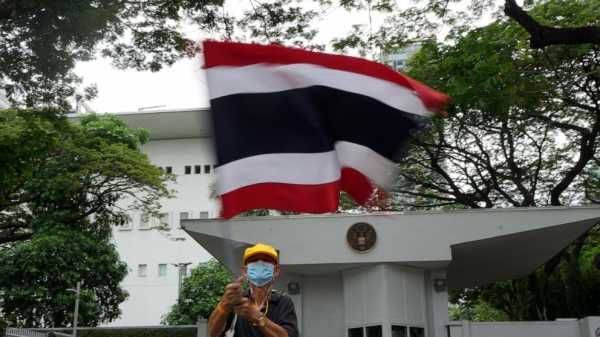
BANGKOK — The U.S. ambassador to Thailand dismissed claims of American interference in recent elections as a “disservice" to the Thai people, saying Tuesday that Washington does not support any individual candidate or political party.
Claims of the U.S. meddling in the May 14 vote have swirled since the opposition Move Forward Party emerged as the top vote getter and another opposition party came in second, raising the possibility of a new coalition government that could take power from Prime Minister Prayuth Chan-ocha.
The Move Forward Party is seen as nominally more pro-American than Prayuth, a former general who initially came to power in a military coup nine years ago, and the claims of American interference in the election are widely seen as originating from supporters of the current status quo.
A small group of protesters even demonstrated in front of the U.S. Embassy in April, accusing Washington of interfering in Thailand political affairs.
At a roundtable with dozens of Thai journalists, Ambassador Robert Godec said when asked about the rumors and conspiracy theories that they “do a disservice to the tens of millions who participated in the political process as voters, as election officials, as poll watchers.”
“Given the persistent and pernicious conspiracy theories, let me be clear,” Godec said. “We categorically reject the false rumors that the United States interfered in the Thai election.”
The Move Forward Party has signed an agreement with seven other parties on a joint platform that they hope will lead to the formation of a coalition government in July. It made no mention of Move Forward's contentious call for the amendment of a harsh law against criticizing the country's monarchy, a position that has drawn the ire of conservative Thais.
It did include several of Move Forward’s core policies, however, such as drafting a new more democratic constitution, passing a same-sex marriage law, decentralizing administrative power and transitioning from military conscription to voluntary enlistment “except when the country is at war.”
It also calls for reforms of the police, military, civil service and the justice process, abolition of business monopolies, and the restoration of controls on the production and sale of marijuana after its poorly executed de facto decriminalization last year.
It is not yet certain, however, that the coalition will be able to take power. It controls a strong majority in the country's lower house, but under the military-drafted constitution the prime minister is selected by a joint vote of the lower house and the Senate, whose members were appointed by the post-coup military government.
Godec stressed that the U.S. has already worked with the current government for years and that Prayuth visited the White House last year along with other Association of Southeast Asian Nation leaders. He also said Washington would continue to work with Thailand's government, whoever is in power.
“The United States has no preferred candidate, we have no preferred political party in Thailand,” he said. “What we do is support the democratic process. The Thai people alone should choose the government.”
Sourse: abcnews.go.com






